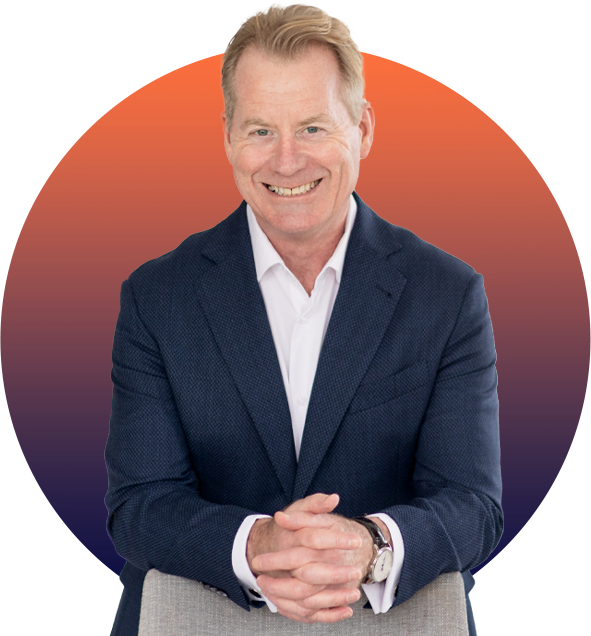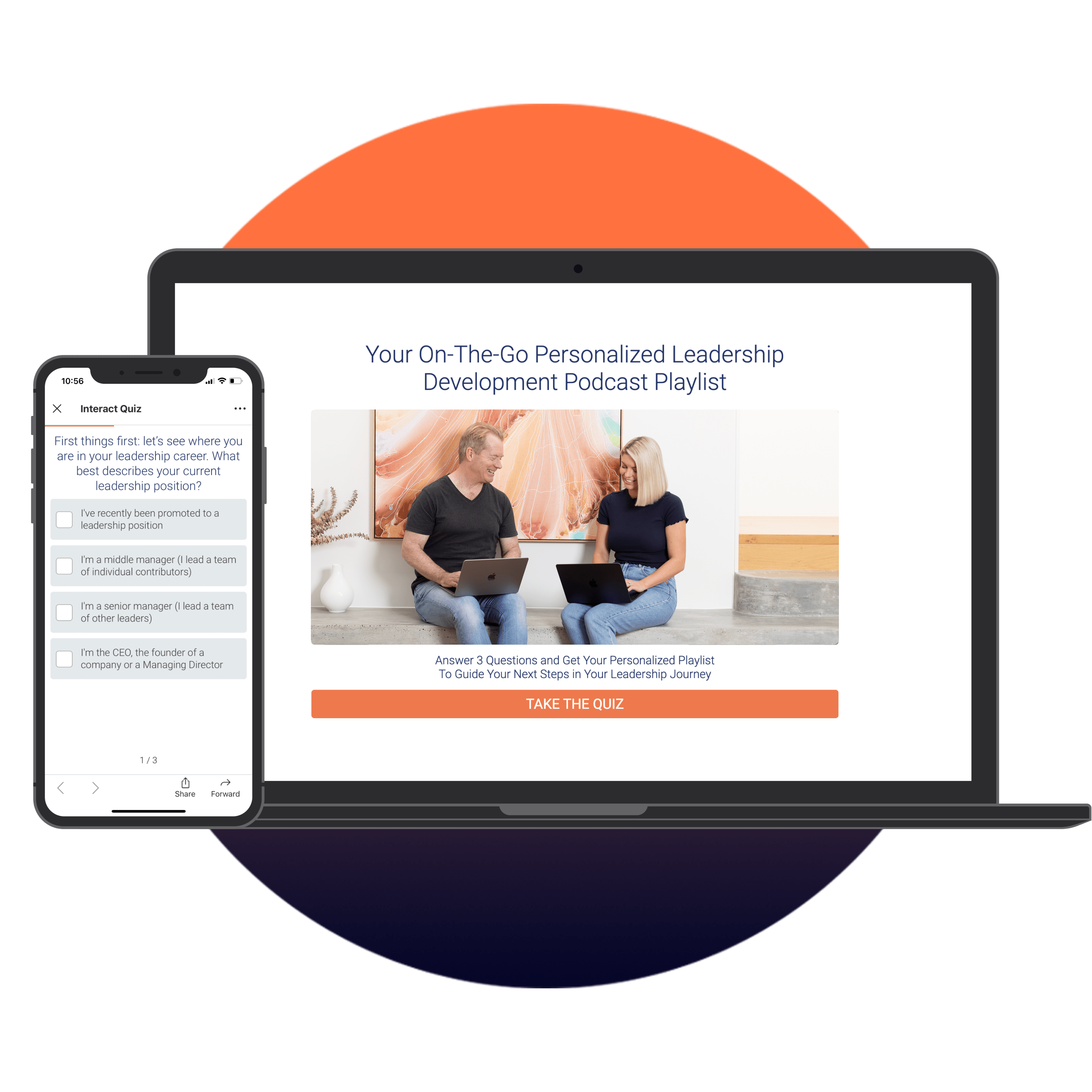With Martin G. Moore

As leaders, we expect most things to be logical. They should make sense to us, and be easy for us to explain to our people. And to a large extent this is true.
But we also can’t overlook the fact that some of the most important principles of success are actually counterintuitive, and we need to be able to hold this dissonance in our heads.
It’s in our nature to look for easy answers to the things that challenge us. The fact of it is, though, there are no silver bullets. Any ground we make as individuals and leaders is hard fought and won.
Embracing this reality makes us stronger, but trying to bargain for an easier path will see us rooted where we are, eventually feeling like victims, and wondering why life is so unfair.
Generate Your Free
Personalized Leadership Development Podcast Playlist

As a leader, it’s essential to constantly develop and improve your leadership skills to stay ahead of the game.
That’s why I’ve created a 3-question quiz that’ll give you a free personalized podcast playlist tailored to where you are right now in your leadership career!
Take the 30-second quiz now to get your on-the-go playlist 👇
Transcript
Hey there, and welcome to Episode 130 of the No Bullsh!t Leadership podcast. This week’s episode, Counterintuitive Truths; The success mindset. As leaders, we expect most things to be logical. They should make sense to us and be easy for us to explain to our people. And to a large extent, this is true. But you also can’t overlook the fact that some of the most important principles of success are actually counterintuitive, and we need to be able to hold this dissonance in our heads. It’s in our nature to look for easy answers to things that challenge us. The fact is though, that there aren’t any silver bullets. Any ground we make as individuals and leaders is hard fought and won. Embracing this reality makes us stronger, but trying to bargain for an easier path, will see us rooted where we are, eventually feeling like victims and wondering why life is so unfair.
So today’s pretty simple. I’m going to look at five of these counterintuitive truths. The first, the bigger the ambition, the slower you need to go. Number two, the more control you try to exert, the less control you actually have. Number three, in order to scale, you often have to do things that aren’t scalable. Number four, the more people who love you, the more likely you are to find someone who doesn’t. And number five, if you choose to do the easy things in life, life becomes hard. But if you choose to do the hard things in life, life becomes easy. So let’s get into it!
I saw this quote recently from Gary Vaynerchuk, “The bigger the ambition, the slower you need to go“. And I realised just how true that is. It got me to thinking of the other truths that are absolutely counterintuitive. One thing that many people lack is patience. If we want to be successful, patience is mandatory. We need to have the patience for our own personal learning and growth. For making sure that the foundations we build for what we ultimately want, are rock solid. But in a world where the pace of almost everything is accelerating, the expectation for speed and immediacy can be overwhelming. For example, in a corporate career, your path to the executive role that you desire so strongly, requires a difficult and sometimes debilitating apprenticeship in, middle management. You have to learn the realities of organisational leadership. How to navigate the politics. Learning to disagree with people who you want to like you. The tough decisions you have to make that you know are going to be unpopular.
The decisions from above that you have to implement, regardless of how irrationalise that may seem to you. The unreasonable expectations sometimes placed on you by your organisation. And the challenge of finding the balance between doing what’s expected and being true to your values. Now, without this apprenticeship, your ability to function as a capable executive would be stunted. That’s why you need the patience of someone who understands that a stellar career unfolds over 30 years, not 2. You won’t get promoted without demonstrated experience and performance. And if by some stroke of luck you actually do, you’ll have holes in your repertoire that can easily bring you undone further down the track. Even the patience required to combine your study, for example I know many of you have MBAs, is tricky. You can get the qualification easily enough, but you’ve got to put it into practise, take your learnings from that and grow with the organisation in your role. All of which takes time. Sometimes you even have to be prepared to go backwards in order to go forwards on a better path.
For me personally, I reached a point in my executive career where I’d done pretty well, but I knew I had a hole in my repertoire. Having spent my whole career in staff roles, I needed to demonstrate that I could excel in a line role where I had P&L accountability. I knew that if I didn’t do this, it would make my path to CEO all the more uncertain and difficult. So I negotiated with a former employer a move into a sales and marketing role that gave me that experience. It was a sideways move. So no real drama I didn’t have to go backwards, but I required the patience of spending a few years in that role, to demonstrate my ability. Had I not done this, it’s really unlikely, that I would have been offered the chief executive role at CS Energy when I was.
The same principle applied when we started Your CEO Mentor. We have massive ambition, so we understand the need to go slowly. Em and I knew right from the start, we are going to be a global brand, but in the first six months, we aren’t even going to try to earn a dollar. We need to focus on testing our content, finding our audience, and confirming that we have unique value in an incredibly crowded market which has no barriers to entry. If we’re focused just on making money before we establish our business model properly, we’ll end up with a very different business, and one that’s unlikely to service all our stakeholders in the longterm. And yes, you are all stakeholders in our business.
For those budding entrepreneurs amongst you, there’s another key concept that Gary V talks about. Funding a business you love by working in a job you hate. Now sometimes people throw caution to the wind and say, “I’m going to pursue my dream. I don’t need to work in a job I hate. My dreams will come true”. Well that’s okay, but are you set up for success? Do you have sufficient capital to withstand a year or two of zero income? Do you actually have a viable business model or just a good idea? Have you done the work to develop the strategy, understand your competition, define your customer segmentation, create your marketing distribution channels, I mean, have you found a way to test this, before you get too excited? Patience pays, people.
Our second counterintuitive truth is, the more control you try to exert, the less control you actually have. Now I talk a lot about working at the right level. One of the things that holds back many leaders from being great, is the desire and need to keep a firm grasp on everything their people do. To make sure it’s done the right way, your way. Many of us feel as though we need to be in direct control of the things that we’re accountable for. But this is poison for you and your people. They will become de-motivated and demoralised. Working for a micro-manager is no fun. And then the impact on you, is that you’ve managed to build yourself an oppressive workload, that burns you out. As long as you’re focused on the work that should be done at lower levels, you’re not doing your own job. You need to stand back, relinquish control, and manage the big picture. Leaders who spend their lives in the minutia, often miss important elements of value delivery and end up with bigger problems than could ever possibly arise, from a lack of attention to the minute detail. If you’re keeping too from a grip on another human, they’ll often find a way to rebel, to reassert their own control. Sometimes, you don’t even see this. You think you have more control, but you actually have less. Are there any parents of teenagers relating to this, perhaps? Ironically, you often have more control when you let people have a strong hand in determining their own path. They’re more likely to act in good faith. They’re more likely to respect you and ask your advice. They’re more likely to come to you with the problems they encounter. Letting go of control will give you the control in the longterm that you need in order to lead success outcomes.
Counterintuitive truth number three, especially for the budding entrepreneurs amongst us. In order to scale your business, you often have to do things that aren’t scalable. Now, I just want to take a moment to talk about the approach that Emma and I take to our business. At Your CEO Mentor, we have ambitions of becoming a global force, as I’ve said. But in growing our community of incredible leaders who follow the No Bullsh!t Leadership philosophy, we take a very individualised approach. In theory, an online leadership development programme like Leadership Beyond the Theory, is ultimately scalable. We could have as many participants as we like, with little extra effort or cost on our part. But for us, we prefer to focus on getting the right outcome for the people who undertake the programme. And this means a highly personalised experience. So our promise is that every student gets direct access to me, which is completely unscalable.
I only have so many hours in a day, right? But that’s why we cap the number of students in each cohort. We guarantee, that I’m going to answer every question from every student during that 7-week program. So although making the outcome dependent on my ability to get to everyone individually detracts from our ability to scale, in our view, it’s only by doing this, that the programme and our students will ultimately be successful. What we do in turn multiplies, through our Leadership Beyond the Theory graduates, because of who they become, and how they lead, for the rest of their careers. So to scale your business, you often have to do things that aren’t scalable. And just remember, while I’m here I can throw in an ad, our upcoming Leadership Beyond the Theory program starts next Monday, 1st of March. So there’s only a few days left to join. Get on it guys, if you’re thinking about it.
Counterintuitive truth number four. The more people who love you, the more likely you are to find someone who doesn’t. This feeds into our respect before popularity mantra. A common problem with many leaders is that they want everyone to like them. Now look as a leader, you shouldn’t need to be liked. It’s an impossible goal. Just walk out in front of whatever building you’re in, and talk to 10 people at random. They aren’t all going to like you. Why would it be any different at work? But wanting to be liked stops you from doing things. Decision-making is a perfect example. You hesitate when making decisions and seek a compromise that keeps everyone happy. This is not a good decision. You water down the right decision by trying to please everyone, and that’s almost impossible. So don’t let it bug you if you aren’t universally liked. You should expect it and you should even welcome it. There’s no point in wishing it were different. There’s no point in agonising over it. You certainly can’t change it.
Now occasionally at Your CEO Mentor we see this principle at play in our podcast reviews, and look, a big thanks to all of our Apple listeners who’ve rated and reviewed the podcast. That’s how we grow and reach more leaders. And Emma and I love reading them because every review is a story of how we’ve made a positive impact on a leader, somewhere in the world. We’ve added value to their leadership journey, which is why we exist. But we also realise that on the way to our ultimate destination, we’re going to find people who think I’m a complete knobhead. To some people, I represent everything they hate. And they’ll have an allergic reaction to me, my message, and the content we produce. But that’s fine. We welcome that. I’m more than happy for the odd person to think I’m a numpty, if it enables me to reach the hundreds of thousands of people that we’ve been able to touch already. It just comes with the territory. And it’s also a good indicator of whether or not we’re pushing the boundaries the way we need to, to create the greatest value.
So imagine our delight last year, when we got our first flagrantly negative podcast review. It came on Apple with a one-star rating and the title “Bad show”. The review itself was a very simple rhetorical question “Who needs this rubbish pod?” Full marks for clear and concise communication. Now, when we saw that, we realised that we are right on track. If you’re not pushing some people’s buttons, you’re not going hard enough. We used to say, when we go snow skiing, “If you don’t fall over, occasionally you’re not pushing yourself. Anyone could look like an Olympic skier on a beautiful sunny day, skiing a wide, even, perfectly groomed trail. But try coming down a 65 degree wall, that looks like a car park full of Volkswagen beetles. It’s a different story, but that, is where you improve.”
Our final counterintuitive truth is one of my favourite quotes. “If you choose to do the easy things in life, life becomes hard, but if you choose to do the hard things in life, life becomes easy“. Every day we get to make choices. Sometimes they’re big choices, and sometimes they seem so small as to be almost irrelevant. Most of the time, we are the only ones who know that these choices even exist. No one else sees them so they’re really easy to avoid. But it’s in our daily everyday habits. Will I order the salad or the burger and fries? Will I go for a run or will I watch another Netflix episode? Will I have this hard conversation with my underperforming employee or will I just let it go? Will I risk being unpopular, by terminating a project that I know won’t meet its promised objectives, or will I pretend everything’s okay, and hope for a result, that deep down, I know can’t be achieved? We all know about these choices and it’s so easy to pursue the immediate self-gratification of ease and comfort. But this is a deceptive and damaging, short term, sugar hit.
Sure, you can spend your life on the couch, watching sports and drinking beer. And in the short term, that may make you completely satisfied, and that’s awesome. But in the longterm, you know you’re going to arrive at a place that can’t possibly be satisfactory, and you will be miserable. That’s why as a leader, focusing on the things that will make you better in the long run, at the expense of your immediate discomfort, is the key to a successful and rewarding career. Don’t look for things to be easy. That’s absolutely not what you want. It’s a deceptive lie that creeps up on you. And most people don’t realise the implications of this until it’s way too late.
No success is ever achieved, in any area of life, by doing what’s easy. So welcome the tough stuff and embrace it. The excruciating patience required, to build the right foundations for your career. The helplessness of loosening your grip on the intricate detail of your people’s work. The feeling of being disliked when you make an unpopular, but necessary decision. Leading isn’t supposed to be easy. If you can get your head around this and push through the barriers that stop most people, you’ll be much more likely to achieve the long-term success and satisfaction that many never get to taste. As a leader, embracing these counterintuitive truths will help make your path more rewarding than you could possibly imagine.
Alright, so that brings us to the end of Episode 130. Thanks so much for joining us. And remember, at Your CEO Mentor, our purpose is to improve the quality of leaders globally. So please take a few moments to share this episode with your leadership network. I look forward to next week’s episode, The Emotional Toll of Leadership.
RESOURCES AND RELATED TOPICS:
Explore other podcast episodes – Here
Take our FREE Level Up Leadership Masterclass – Start now
Leadership Beyond the Theory- Learn More
YOUR SUPPORT MATTERS
Here’s how you can make a difference:
Subscribe to the No Bullsh!t Leadership podcast
Leave us a review on Apple Podcasts
Repost this episode to your social media
Share your favourite episodes with your leadership network
Tag us in your next post and use the hashtag #nobsleadership


